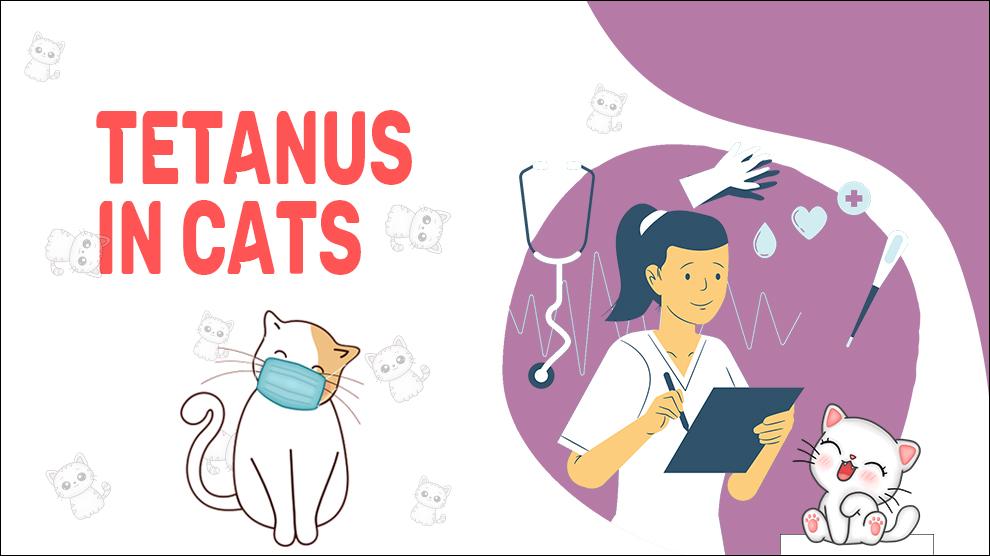What Is Tetanus In Cats?
Tetanus is a rare but potentially deadly bacterial infection that affects cats and other animals. The disease is caused by the bacterium Clostridium tetani, which can be found in soil and animal feces.
Tetanus is characterized by severe muscle stiffness and spasms, particularly in the neck and jaw, and can lead to respiratory failure and death if left untreated.
While tetanus is rare in cats, it is important for cat owners to be aware of the symptoms and seek prompt veterinary care if they suspect their cat may have contracted the disease.
Clinical Signs Of Tetanus In Cats
Symptoms of tetanus in cats usually develop within several days to a few weeks after the initial infection.
The most common early signs include muscle stiffness, spasms, and rigidity, particularly in the neck and jaw. Affected cats may have difficulty opening their mouths, eating, or drinking, and may drool excessively.
As the disease progresses, muscle spasms and rigidity may spread to other parts of the body, and affected cats may have difficulty walking, standing, or breathing.
In severe cases, tetanus can lead to respiratory failure and death.
- Rapid Heartbeat
- Rapid Breathing
- Clenched Jaw
- Sensitivity To Touch
- Spasm Of Jaw Muscles
- Erect Ears
- Stiff Tail
- Excessive Saliva
- Difficulty Chewing
- Fever
Treatment Options For Tetanus In Cats
Treatment for tetanus in cats typically involves supportive care and medication to manage symptoms.
Cats may be hospitalized and given intravenous fluids to prevent dehydration and maintain electrolyte balance.
Medications such as muscle relaxants and antispasmodics may be used to manage muscle stiffness and spasms. Antibiotics may also be prescribed to fight the infection and prevent further spread of the bacterium.
Home Remedies For Tetanus In Cats
It is important to note that home remedies should not be used as a substitute for veterinary care. Tetanus is a serious medical condition that requires immediate veterinary attention and treatment.
Attempting to treat tetanus at home can be dangerous and potentially fatal for your cat.
If your cat has been diagnosed with tetanus, it is important to follow your veterinarian's treatment plan.
They may prescribe medications such as muscle relaxants, antibiotics, and anti-toxins to help control the disease and prevent further complications.
In addition to veterinary treatment, you can help your cat by providing a calm and quiet environment to reduce stress and minimize muscle contractions.
You can also ensure your cat is receiving proper nutrition and hydration, as well as providing comfortable bedding and support for their affected muscles.
It is crucial to prevent tetanus in cats by ensuring they receive routine vaccinations and proper wound care.
If you notice any signs of injury or infection in your cat, it is important to seek veterinary attention immediately to prevent the development of tetanus.
How To Prevent Tetanus In Cats?
Prevention of tetanus in cats involves vaccination and proper wound care. Cats should be vaccinated against tetanus as part of their routine vaccination schedule.
It is also important to properly clean and treat any wounds or injuries to prevent infection.
If a cat is injured, it should be examined by a veterinarian as soon as possible to ensure proper wound care and minimize the risk of infection.
Affected Cat Breeds Of Tetanus
Tetanus is rare in cats and can occur in any breed.
Causes For Tetanus In Cats
Causes:
Tetanus is caused by the bacterium Clostridium tetani, which can be found in soil and animal feces.
The bacterium can enter the body through puncture wounds, scratches, or other types of skin injuries.
Once inside the body, the bacterium produces a toxin that interferes with the function of the nervous system, leading to muscle stiffness and spasms.
When To See A Vet For Tetanus In Cats?
If you suspect your cat may have contracted tetanus, it is important to seek veterinary care immediately.
Early treatment is essential for managing symptoms and preventing the disease from progressing.
Signs of tetanus in cats may include muscle stiffness, spasms, and rigidity, particularly in the neck and jaw, as well as difficulty eating, drinking, walking, or breathing.
Food Suggestions For Tetanus In Cats
If your cat has tetanus, it is crucial to consult a veterinarian immediately for proper diagnosis and treatment.
Some general considerations for feeding a cat with tetanus:
- Soft, easily chewable food: Tetanus can cause difficulty in swallowing, so offering soft food like canned wet food may be easier for your cat to eat.
- Nutrient-dense diet: Ensure the food you provide is nutritionally balanced to support your cat's overall health and immune system.
- Appetizing options: Cats with tetanus may have a reduced appetite, so offering tasty options or warming the food slightly could encourage them to eat.
Remember, veterinary guidance is essential for managing tetanus in cats.
Conclusion
Tetanus is a serious and potentially fatal disease that can affect cats. It is caused by the toxin produced by the bacterium Clostridium tetani, which can enter the body through a wound or cut.
The symptoms of tetanus in cats can be difficult to identify, as they may resemble other conditions, but it is important to seek veterinary care immediately if you suspect your cat may have been exposed to the bacteria.











